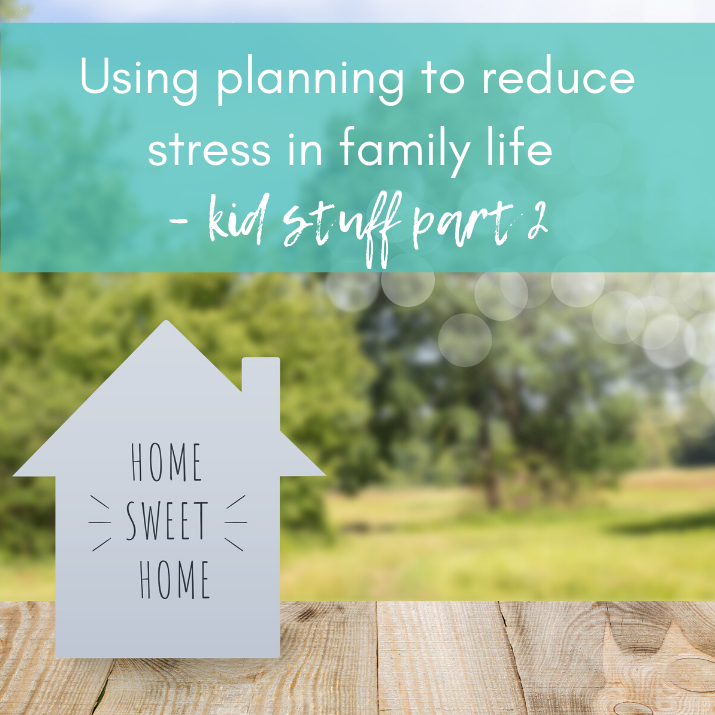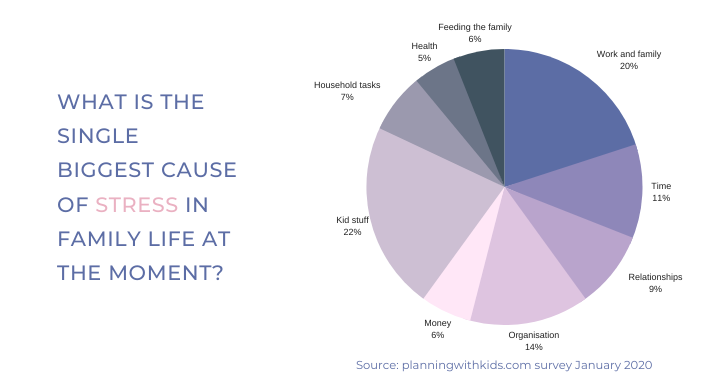
This post is part of a series on how we can manage the stress of family life. You can find other posts in the series by clicking here.
With so many readers nominating kid stuff as the biggest cause of stress for (22%) I have dedicated two posts to this topic. You can find the first post by clicking here where I suggest strategies you can use to help manage stressful areas like getting the kids ready in the morning, after school activities, managing homework, and managing device use.

In this post I am going to look at kids fighting, kids behaviour and kids’ routines in general.
Kids’ fighting
Kids’ bickering or arguing here or there, is no big issue. Sibling fighting is just as much a part of family life as the fun parts are. But when there is consistent and higher level fighting, this can be super stressful.
For me, it is generally a sign that something more broader in family life isn’t right. Our family does have times when I think there is too much fighting. When it gets to this point, I find the most important thing I can do is to spend some time analysing why this is happening. Here are some questions I consider in looking at why the fighting is happening:
- Is it happening at a similar time each day?
- What is the pace of family life like?
- How well and rested are the children?
- Is it connected to a particular activity?
- How much outside time have the kids had?
- How much time have I been spending playing/bonding with the kids?
- How much time have the kids had apart recently?
- Are any of the kids going through a challenging stage (eg 3.5 year old etc )?
- Have I been asking too much of the older children?
- Have I been too lenient on the younger kids?
- What has my tone and attitude been like?
In this post I offer some short term and long term solutions that we use to curb the fighting and restore family harmony. But I didn’t include in this post the two key overarching strategies I use to reduce the levels of stress that kids’ fighting causes in the household:
Be selective when and how I intervene – at the first sign of bickering or an argument, it can be tempting to jump in and try to stop it quickly. My thought process for doing this has always been that if I stop it now it won’t get any worse. Unfortunately, though I have learned on too many occasions, that it rarely works out like that. It is more likely to actually increase my stress levels because I have now made myself the referee. A referee who has two different versions of a story that I need to make a ruling on. No matter what I decide someone is going to be unhappy and there will be complaining or grudge-holding or other poor behaviour that lingers for longer.
Also by me stepping in so soon, it can create a mentality of me being the problem solver and can lead to the kids coming to me to solve their disputes, without them really trying to resolve them first themselves. I have now learned to keep an ear and eye on things and only intervene when I think there is no way they are going to resolve the situation in a successful manner (that is not resorting to violence!). I am not always perfect at this, but it only takes an early intervention blow up to remind me why it is less stressful overall if I can wait for the right time to intervene.
Stay calm and quiet – when kids’ emotions are flying high, it can be contagious to your emotions, unless you are consciously aware of them. Once the fighting amongst the kids has reached the point where I need to intervene, I will remind myself that I need to do so calmly and with a quiet voice.
If I raise my voice, the kids are much more likely to raise their voices (if they aren’t already). If I enter the fray with anger or frustration visible, the kids will immediately react defensively and aggressively towards it. It is much harder to yell at someone who is speaking quietly and has a calm body language. If I can do this, I can reduce the stress levels of the situation much faster and therefore get to a solution quicker.
Kids’ behaviour
Challenging behaviour in kids can be incredibly stressful. It might be the 3.5 year old who refuses to get themselves dressed (read this post if that is the case, Characteristics of Three (and a half) Year Old Behaviour) or a teenager yelling at you that you are ruining their life (if this is the case read this post My top 10 tips for parenting teenagers). Regardless of the age of the child, their behaviour can cause you stress, make you cry, make you pull your hair out and feel at a loss at times at how to manage it.
There is no one strategy or group of strategies that I have which would eliminate the stress related to kids’ behaviour completely. But there are some things that I think work to at least reduce the stress associated with it:
- Don’t take it personally – while this is especially applicable to teenagers, it can apply to all kids. Kids don’t behave badly to spite us. The reality is however that teenagers (and some kids) can say very mean things and behave very poorly. While I don’t condone their behaviour, I have learnt that taking it personally doesn’t help. They very often say things they don’t mean, they speak without thinking through what they are saying and their responses are often based off pure emotion! Holding on to their words or actions will make us more stressed. We are better to acknowledge it and deal with it as needed, then let it go (as hard as that can be sometimes).
- Role model the behaviour you want to see – very often kids observe our behaviour much more than they listen to our words. If we ask them to speak nicely, use manners, treat other family members with respect, etc but don’t role model this ourselves, we are unlikely to have success. I find role modelling particularly important for teenagers. This means choosing wisely what I comment on and what behaviours I want to role model.
- Know your limits – there are times when everyone reaches their limits with their own kids. It is important to know your own limits not only so you can have a strategy in place to be able to take a break, but to prevent the situation from escalating. When my patience is running out and the kids keep testing it, I know I will not react as well as I should. If my behaviour isn’t great, it just makes everything worse. As the kids’ dad and I live together this is easier for me than it would be for a solo parent. I can remember many times when the kids were younger, I would be waiting for my husband to walk in the door so I could tag him in and it would be his turn to take the lead role.
- Read and research – each of my five kids has a different personality. Along with this comes different behaviours. While my overarching parenting style is the same for all of our kids, I have very much personalised the behaviour management side of parenting for each child. For some who have had some more challenging behaviours this has meant doing a lot of reading and research to work out how I should best interact with them. This approach does take time and it can take trying out a number of strategies before it works, but it definitely gives better stress reduction over the long term. If you are looking for some books to help with challenging behaviours, you can see what books I loved here.
Kids’ routines
For some the word “routines” brings instantly to mind feelings of being restricted, boring, limited and not fun. I can understand why people might have that perception, but routines do not have to be like that at all. Routines can greatly reduce stress in your life by:
- Reducing your workload as kids can do things for themselves that they are capable of rather than you doing it for them
- Delegate household tasks to other members of the family to free up more time for yourself
- Decrease the amount of requests you have to make to the kids to get them to do things as they take ownership of creating their own habits
- Prevent the kids from constantly asking you what they are doing next and when they can get on the PS4/iPad/TV etc
- Allow you to establish processes for those repetitive tasks of family life like lunch boxes, school notices, homework etc so things don’t get overlooked, lost or forgotten.
I have collated a number of the kids’ routines over the years into one Google Spreadsheet. It is important to note that routines need to be evolving and changing as the kids grow and as circumstances change – like they have done recently with the COVID-19 pandemic restrictions.
Early this year I created new routines for the younger two kids for COVID-19 school holidays and for home learning. You can download a copy of the spreadsheet here. To be able to edit this spreadsheet and use yourself, you will need to make a copy of this sheet first. To do that you need to:
- Open the sheet you want to use
- Click on ‘file’, then ‘make a copy’
- Name the sheet and click on okay
- You will now be able to enter your time data into the spreadsheet. You will need a Google account to do this.
If you don’t have a Google account already you will need to sign up for one. This doesn’t mean you have to get a gmail address. Google accounts don’t have to use Gmail addresses. A Google account is simply a unified sign-in system that gives you access to Google products, including Drive, Docs, Sheets, and Slides. You can associate any email address with a Google account. To sign up for a Google Account go here.
And finally…
It is important to remember that with all of the stress that kids can possibly cause us, there also comes great joy, eternal love, amazing personal growth and deep happiness.
There is a saying that you get what you focus on, so you should focus on what you want! As parents, we can choose where to focus our attention. We can choose to focus all of our attention on all the stress the kids are bringing us, or we can choose to acknowledge the stress, manage it the best way we can and focus on the positive the kids bring to our lives.
This of course does not make the stress disappear, but it can help greatly with how we feel about our life. As Jack Canfield says:
“You only have control over three things in your life-the thoughts you think, the images you visualise, & the actions you take.”
― Jack Canfield

